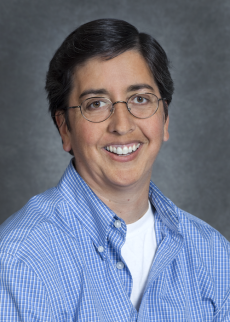CRD Takes Lead at DOE Cybersecurity Workshop
Cybersecurity workshop identifies weaknesses and solutions for open science
February 1, 2007
CRD scientists co-chaired and led discussions in a DOE Office of Science workshop last month that defined the research and development goals for cybersecurity in the global scientific community.
The three-day workshop, sponsored by the Office of Advanced Scientific Computing Research and titled, “DOE Cybersecurity R&D Challenges for Open Science,” pooled knowledge and experiences from about 40 cybersecurity production personnel and cybersecurity researchers from across the DOE Office of Science laboratories, along with representatives of other cybersecurity organizations and DOE headquarters.
Deb Agarwal, head of CRD’s Distributed Systems Department, along with Mike Robertson (DOE) and Walter Dykas (ORNL) co-chaired the workshop that took place at the American Geophysical Union Building in Washington, D.C.
“The workshop was something we had never done before at DOE,” Agarwal said. “It was wonderful to bring together researchers and production personnel from across DOE to talk about what cybersecurity research is needed to support DOE science.”
Strong yet flexible cybersecurity measures are crucial to enabling international collaborative scientific research while protecting DOE resources. Scientists rely on high-speed networks such as the Energy Sciences Network (ESnet) and specially developed software to conduct simulations, move data and carry out experiments at one-of-a-kind facilities such as the Large Hadron Collider at CERN and the soon-to-be-built ITER fusion reactor in France. They also use the resources to analyze data and conduct simulations at supercomputer centers such as the National Energy Research Scientific Computing Center (NERSC) at Berkeley Lab.
According to ESnet, which is managed and staffed within CRD, 18 of the top 20 data flows in 2005 were either destined for or originated from an international site. More than 50 percent of the principal investigators for the Office of Science projects are located at universities. The diversity and the scale of the scientific community make it difficult to monitor activity and recognize malicious behavior.
“There was strong consensus regarding the urgency of addressing the cybersecurity needs for open science,” Agarwal said.
During the workshop, participants tackled a variety of subjects, from identifying vulnerabilities and network performance requirements to determining high-priority research directions.
Agarwal opened the workshop with a talk titled “The Open Science Cybersecurity Challenge.” Vern Paxson, a CRD researcher known for his development of Bro, an open source, UNIX-based network intrusion detection system, gave the talk “Cybersecurity Research and Development Focused on Open Science.” Bill Johnston, head of ESnet, moderated a discussion on high-end computing and networking facilities. Bill Kramer, NERSC’s General Manager, moderated a discussion on authentication and authorization.
Other participants from Berkeley Lab included Brent Draney of NERSC, Brian Tierney of CRD, Eli Dart of ESnet, Dwayne Ramsey of the IT Division and John Hules of Computing Science’s Communications Group.
Agarwal and Tierney co-authored whitepapers for the workshop, as did Dan Peterson, Mike Helm, and Dart of ESnet and Scott Campbell, Howard Walter and Draney of NERSC.
About Berkeley Lab
Founded in 1931 on the belief that the biggest scientific challenges are best addressed by teams, Lawrence Berkeley National Laboratory and its scientists have been recognized with 16 Nobel Prizes. Today, Berkeley Lab researchers develop sustainable energy and environmental solutions, create useful new materials, advance the frontiers of computing, and probe the mysteries of life, matter, and the universe. Scientists from around the world rely on the Lab’s facilities for their own discovery science. Berkeley Lab is a multiprogram national laboratory, managed by the University of California for the U.S. Department of Energy’s Office of Science.
DOE’s Office of Science is the single largest supporter of basic research in the physical sciences in the United States, and is working to address some of the most pressing challenges of our time. For more information, please visit energy.gov/science.










